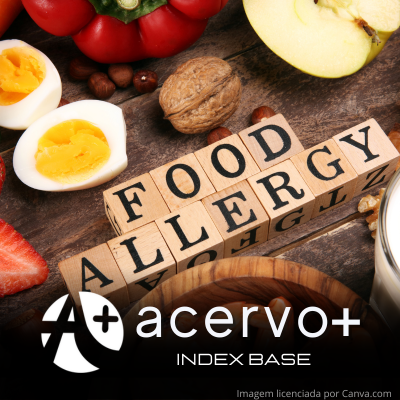O impacto psicossocial e emocional das alergias alimentares em crianças
##plugins.themes.bootstrap3.article.main##
Resumo
Objetivo: Realizar uma revisão integrativa dos estudos que abordam o impacto psicossocial e emocional das alergias alimentares em crianças. Métodos: Este estudo consiste em uma revisão integrativa. Realizou-se uma busca na base de dados do PubMed, resultando na identificação de 17 artigos relevantes. Resultados: Os resultados revelaram que crianças com alergias alimentares frequentemente enfrentam uma carga significativa de desafios psicoemocionais, afetando também a saúde mental de seus cuidadores. Uma lacuna identificada é a escassez de intervenções direcionadas para auxiliar os portadores de alergias alimentares a lidar com esses desafios. Diversos métodos de avaliação do impacto nas interações sociais dessas crianças foram examinados e demonstraram ser eficazes. Considerações finais: Conclui-se que a busca por intervenções destinadas a melhorar a qualidade de vida das crianças com alergias alimentares e de suas famílias tem progredido e obtido resultados positivos. No entanto, ainda existe uma carência significativa de apoio emocional para muitas crianças e adolescentes que lidam com alergias alimentares.
##plugins.themes.bootstrap3.article.details##
Copyright © | Todos os direitos reservados.
A revista detém os direitos autorais exclusivos de publicação deste artigo nos termos da lei 9610/98.
Reprodução parcial
É livre o uso de partes do texto, figuras e questionário do artigo, sendo obrigatória a citação dos autores e revista.
Reprodução total
É expressamente proibida, devendo ser autorizada pela revista.
Referências
2. CÂNDIDO FG, et al. Breastfeeding versus free distribution of infant formulas by the Public Health System. Einstein, 2021; 19: eAO6451.
3. CHEON J, et al. Effectiveness of educational interventions for quality of life of parents and children with food allergy: A systematic review. Medicine (Baltimore), 2022; 101(36): e30404.
4. DUNLOP JH, KEET CA. Epidemiology of Food Allergy. Immunol Allergy Clin North Am, 2018; 38(1): 13-25.
5. DUNNGALVIN A, et al. APPEAL‐1: a multiple‐country European survey assessing the psychosocial impact of peanut allergy. Allergy, 2020; 75(11): 2899-2908.
6. HERBERT L, et al. Psychotherapeutic Treatment for Psychosocial Concerns Related to Food Allergy: Current Treatment Approaches and Unmet Needs. J ALLERGY CLIN IMMUNOL PRACT, 2021; 9(1): 101-108.
7. HOFNER V, et al. Health-related quality of life in food and venom induced anaphylaxis and role of influencing factors. Clin Exp Allergy, 2023; 53: 295-306.
8. JUNG M, et al. Psychological Distress and Perceived Burden in Parents of Korean Children With igE-Mediated Food Allergy. J Korean Med Sci, 2023; 38(27): e208.
9. KIM S, et al. Quality of Life in Food Allergy: Validation of the Korean Version of the Food Allergy Quality of Life Questionnaire Parent Form (K-FAQLQ-PF) and Risk Factor Analysis. Allergy Asthma Immunol Res., 2023; 15(1): 43-54.
10. LEE S. Assessment of Quality of Life in Food Allergy. Allergy Asthma Immunol Res., 2023; 15(1): 4-7.
11. MARSAC ML, WURTH MA. Opportunities to support emotional health in school-age children with food allergy. Ann Allergy Asthma Immunol, 2021; 126(6): 728-729.
12. MENDOÇA RB. Evaluation of the measurement properties of the Brazilian version of two quality-of-life questionnaires in food allergy - for children and their parents. J Pediatr (Rio J), 2020; 96(5): 600-606.
13. MILLER J, et al. Quality of life in food allergic children: Results from 174 quality-of-life patient questionnaires. Ann Allergy Asthma Immunol, 2020; 124(4): 379-384.
14. PATEL GB, et al. Quality of life is lower in adults labeled with childhood-onset food allergy than in those with adult-onset food allergy. Ann Allergy Asthma Immunol, 2021; 127(1): 70-75.e2.
15. RAMOS A, et al. The Food Allergy Parent Mentoring Program: A Pilot Intervention. J Pediatr Psychol, 2021; 46(7): 856-865.
16. ROCTOR KB, et al. A systematic review of parent report measures assessing the psychosocial impact of food allergy on patients and families. Allergy, 2022; 77(5): 1347-1359.
17. STOCKHAMMER D, et al. Living with food allergy: What this means for children. J Child Health Care, 2022; 26(2): 262-274.
18. SUGUNASINGHA N, et al. Evaluating an online self-help intervention for parents of children with food allergies. Pediatr Allergy Immunol, 2022; 33(2): e13731.
19. THOMAS J, et al. Cognitive-behavioral therapy for avoidant/restrictive food intake disorder (CBT-AR); Feasibility, acceptability, and proof-of-concept for children and adolescents. Int .J Eat Disord, 2020; 53(10): 1636-1646.
20. TOMEI L, et al. Hidden and Rare Food Allergens in Pediatric Age. Nutrients, 2023; 15(6): 1386-1400.

